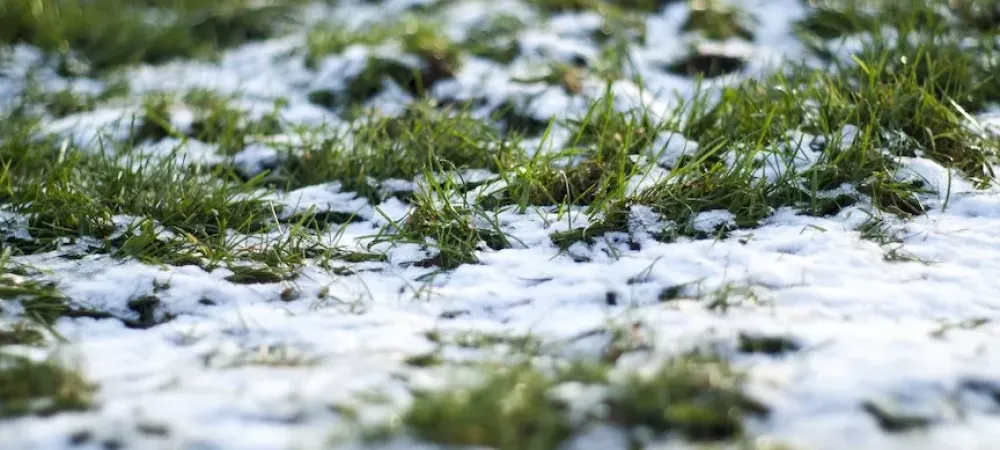Winter Kill and How it Impacts Your Minnesota Lawn

Winters here in Minnesota can be harsh on our lawns. It is not uncommon for one’s grass to look unsightly once the warm weather and spring appear. Winter kill is the term used to describe any winter lawn damage that leads to a plant’s death. Our winter conditions vary year to year with unpredictable snowfall and temperatures, sometimes with invariable and rapid changes. Like the roads that quickly deteriorate whenever the temperatures go from one extreme to the other, so do our lawns. Extreme thawing and refreezing can lead to higher probabilities of winter kill.
The major contributors to winter kill include winter desiccation, crown hydration, direct low-temperature kill, ice sheets, and snow mold. In this article, we highlight and explain a few.
Winter Desiccation
Let’s start with winter desiccation. During winters in which we see a ton of snowfall, this is usually not an issue. However, if we go through a winter with long dry spells, extreme dryness due to lack of moisture can occur. Without snow cover, the dry winter winds bombard the grass, pulling moisture out of the blades and leaving them dried out. Because the ground is frozen, the grass cannot draw in water to replace the moisture that is lost. This results in the death of the grass.
Treatment and Prevention of Winter Desiccation
Because the weather is so hard to predict, winter desiccation is hard to prevent. Once spring arrives, you can wait patiently to see if your turf rebuilds itself and return to its original health. If the damage is widespread, you will need to re-seed areas that are damaged.
The best way to prevent winter desiccation is with proper lawn care throughout the year. At Showcase Lawn Care, we have two different lawn care programs to help you maintain a perfect, healthy lawn. By meeting your lawn’s seasonal needs, you’ll be boosting the health of your grass. Robust grass is much more difficult to damage and much faster at recovering.
Crown Hydration
The second most common type of winter kill is crown hydration, and it is often considered the worst. It usually appears in late winter to early spring when extreme temperature fluctuations occur. When the temperatures go up, the grass is tricked into waking up. It starts absorbing water like its spring. When the temperatures again drop below freezing, the water in the grass freezes. This causes the cells inside to burst.
This damage leads to extensive winter kill in the grass. Cool-season grasses are especially susceptible to crown hydration injury since they’re more likely to awaken from winter dormancy at the first break of warmer temperatures.
Prevention and Treatment of Crown Hydration
Crown hydration is another type of winter kill that is difficult to prevent. Like winter desiccation, the best way to avoid crown hydration is with proper lawn maintenance throughout the year. By properly feeding, watering, and maintaining your lawn, you can strengthen your grass before our cold Minnesota winters.
Snow Mold
This fungal disease begins to reveal itself in the spring as the snow melts. There are two kinds of snow mold in Minnesota that become active under the snow, white and pink. It appears as water-soaked circular patches of grass. Pink snow mold is the most virulent and attacks the crown of your grass resulting in the unsightly look of your lawn.
Prevention and Treatment of Snow Mold
Prevention happens throughout the year by properly maintaining your lawn. With regular fertilization, weed control, and proper irrigation techniques, you can create stronger and more robust grass. Your healthy turf will be more resistant to lawn fungi like snow mold. Reducing the amount of thatch on your grass with fall aeration services can also help prevent an outbreak of snow mold. Mow your lawn short at the end of the fall to prevent your grass from becoming matted.
If you do find snow mold in the spring, let the affected areas dry out. You can help by raking the areas and breaking up some of the thatch. If all else fails, use a fungicide.
Get Help From The Professionals at Showcase Lawn Care
The best method of prevention for winter kill is a well-maintained lawn. Help your turf become healthier and stronger throughout the year without lawn care services from Showcase Lawn Care. A yearly lawn care program containing fertilizer and weed control can go a long way to preventing winter disease.
Call today at 763-415-7383 or contact us here.
